

- Call 908 543 4390
- Email
- Dr.Joni Redlich PT,DPT


by Wendy Canary, PT
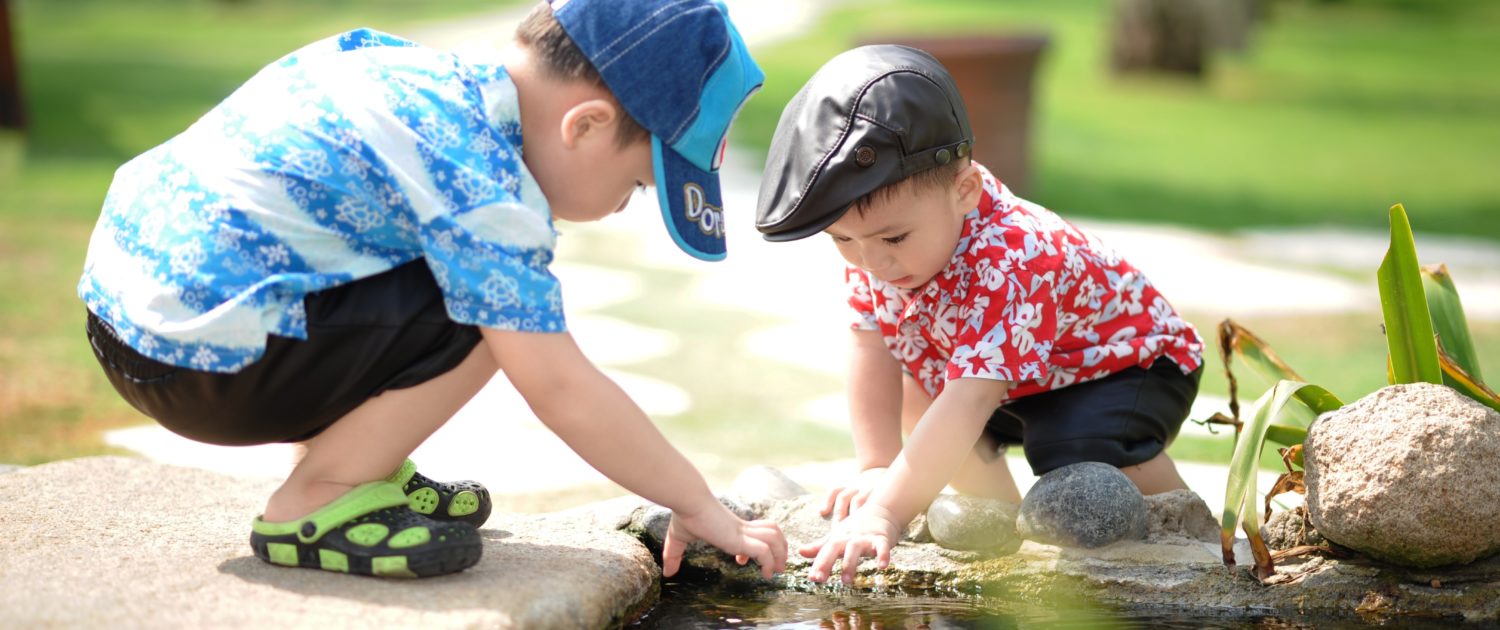
Play! Hearing this word may bring up a million different pictures in your head. Maybe you think of a baseball game or a mound of clumsy puppies rough housing or a baby giggling at a game of peek-a boo. No matter what the age or species, play time is an important piece of development and healthy growth.

In the first year of life, all that a baby does looks like play. Their body proportions, big eyes and sweet smiles add to the image of a playful baby. But those first moments of play represent important work. Babies are exploring their bodies and the world around them and in doing this developing their visual, sensory and motor skills. This exploring can take place while being held, sitting supported or during floor time on their belly and back. Floor time is where they learn to move against gravity, visually focus on objects around them, and problem solve how to explore their environment. As parents we have front row seats to watch for the sweet moments when they first turn their head to your voice, focus their eyes on the toy you are holding, lift their head and chest up off the floor to look around, or master the ability to sit themselves up! These moments happen when they are free to explore the magical world around them that you have created. Cherish these sweet moments of floor time and watch your baby learn and master each skill!
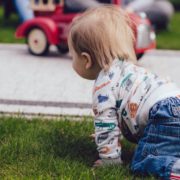
Then it happens, your little one learns to crawl then walk and this is when the game changes! They are able to reach new objects, push toys around, climb onto furniture and get into some mischief. As they move and play their core stability, balance and coordination will increase and the clumsiness of their movements will improve. Toddlers and preschoolers love to play! They will find fun in just about anything and will move from throwing, climbing, running to jumping. They are busy exploring all the ways their bodies can move, imitating all those around them and discovering ways the environment around them can be a jungle gym. This can be an exhausting phase for parents! Take heart in knowing that they are again doing the hard work of growing their motor, visual and sensory skills. However it is okay and important to take breaks in the action and encourage quiet play as well, with building toys, dolls, reading books together, pretend play etc. Take time each day to play on the floor with your child. They will not only be playing but they will be developing their language, social, fine motor and play skills through interacting with you. Chances are you will love this time together and find you stay longer than you expected.
 Once our children enter into the structure of school, the available time for play changes. After school hours quickly fill up with homework, recreational sports, dance, clubs etc. It can be difficult to find time for free play but it continues to be important for the development of a child. Through play at this age, they are not only developing their coordination, strength, and balance but they are developing intellectual, social and communication skills through interactions with their family and peers. In a generation where smart phones are changing how we communicate, there is value in the face to face interactions through a backyard game of tag, or a play date at a park or a game night with the family. Creating the space in their schedule for free time allows the child to rest, decompress and find activities they enjoy!
Once our children enter into the structure of school, the available time for play changes. After school hours quickly fill up with homework, recreational sports, dance, clubs etc. It can be difficult to find time for free play but it continues to be important for the development of a child. Through play at this age, they are not only developing their coordination, strength, and balance but they are developing intellectual, social and communication skills through interactions with their family and peers. In a generation where smart phones are changing how we communicate, there is value in the face to face interactions through a backyard game of tag, or a play date at a park or a game night with the family. Creating the space in their schedule for free time allows the child to rest, decompress and find activities they enjoy!
As a child moves into their teen years, the activities they may choose in their free time will change but the need for  ‘down time’ is equally as important. Being active and engaging in activities that are enjoyable will not only provide the life skills needed for healthy living but also have the added benefit of stress management. Young adults are feeling the pressures of expectations in so many areas of their lives, it is a gift for them to be given the permission to schedule down time without any structure or expectations. For some this may be to play guitar, or take a run, or play a game of basketball with friends or have an impromptu dance party, but whatever their activity of choice is, it will be a time to decompress, recharge and ultimately lead to healthy mental and physical health.
‘down time’ is equally as important. Being active and engaging in activities that are enjoyable will not only provide the life skills needed for healthy living but also have the added benefit of stress management. Young adults are feeling the pressures of expectations in so many areas of their lives, it is a gift for them to be given the permission to schedule down time without any structure or expectations. For some this may be to play guitar, or take a run, or play a game of basketball with friends or have an impromptu dance party, but whatever their activity of choice is, it will be a time to decompress, recharge and ultimately lead to healthy mental and physical health.
No matter what the age, play is a part of life. It is vital to the development of a child and to the health of all ages. As parents we have the job to guide, role model and create the opportunities for exploration through play. Whether you are on the floor with your baby, scheduling a play date at the park with your toddler or taking a hike as a family, you are modeling the importance of play. Play is not wasted time but the building blocks of the skills our children need for their bright futures!
Let’s play!
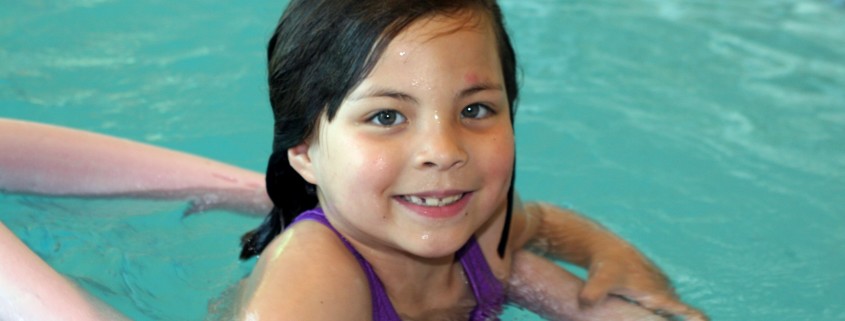
Summer is the time to swim and the therapeutic benefits are endless to playing and moving in the pool. Many children who have difficulty controlling their bodies for sports and gross motor activities will have success moving in the water. Hip hip hooray for creating positive movement experiences to build confidence! But seriously, there is nothing more powerful than a positive experience to build a foundation of possibilities.
Why is it so unique?
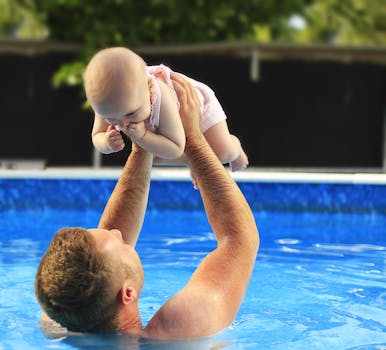
Water provides 30x more deep pressure to the body than air and it is in full contact input to the body. Many children who become adept at swimming underwater will find it a very calming and organizing place to be.
Moving through water creates controlled vestibular stimulation in various planes. All of this enhanced sensory input helps with body awareness development and motor learning.
In addition to swimming, children can walk, somersault, or do angels in the water when supported on their backs.
The water is a natural environment for children to improve their oral-motor skills. Blowing bubbles in the water, blowing through a straw, or blowing ping pong balls across the pool are fun ways to introduce blowing skills.
The intense sensory input in the water will often increase language and lots of singing in the pool will further enhance those opportunities!
Gross Motor Skills
Water can either assist or provide resistance to active movement through all planes of motion, facilitating gains in strength for all major muscle groups. The gravity-lessened environment of wat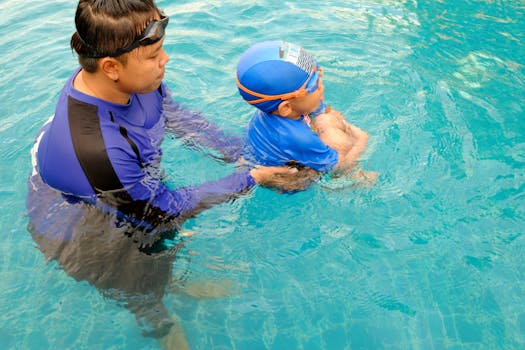 er can help children explore and practice movements and skills they are not yet able to perform on land. Children with difficulty standing on one leg, jumping, or hopping on land can do so in the water.
er can help children explore and practice movements and skills they are not yet able to perform on land. Children with difficulty standing on one leg, jumping, or hopping on land can do so in the water.
Children who are learning to walk are assisted by the water because it slows down movements and gives the child more time to react.
A fun way to practice these skills is to pretend to be different animals for a length of the pool: jump like a frog, paddle like a seal, float like a fish, gallop like a horse. For children who benefit from visual cues, bring a collection of plastic animals that the child can choose from.
Motor Planning
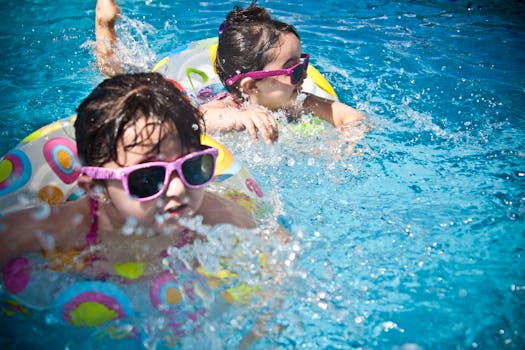
Motor planning skills can be enhanced by experimenting with different ways to use a pool noodle, such as sitting on it like a swing, or a horse, or floating on back with the noodle under knees. Similarly, see how many ways a child can use a kickboard, from sitting to kneeling to standing to holding it and kicking legs.
Have Fun!
Even when looking at swimming and playing in the water as therapeutic, as long as the child is moving in the water, they are getting a benefit. Focus on fun and all of the other benefits will come!
